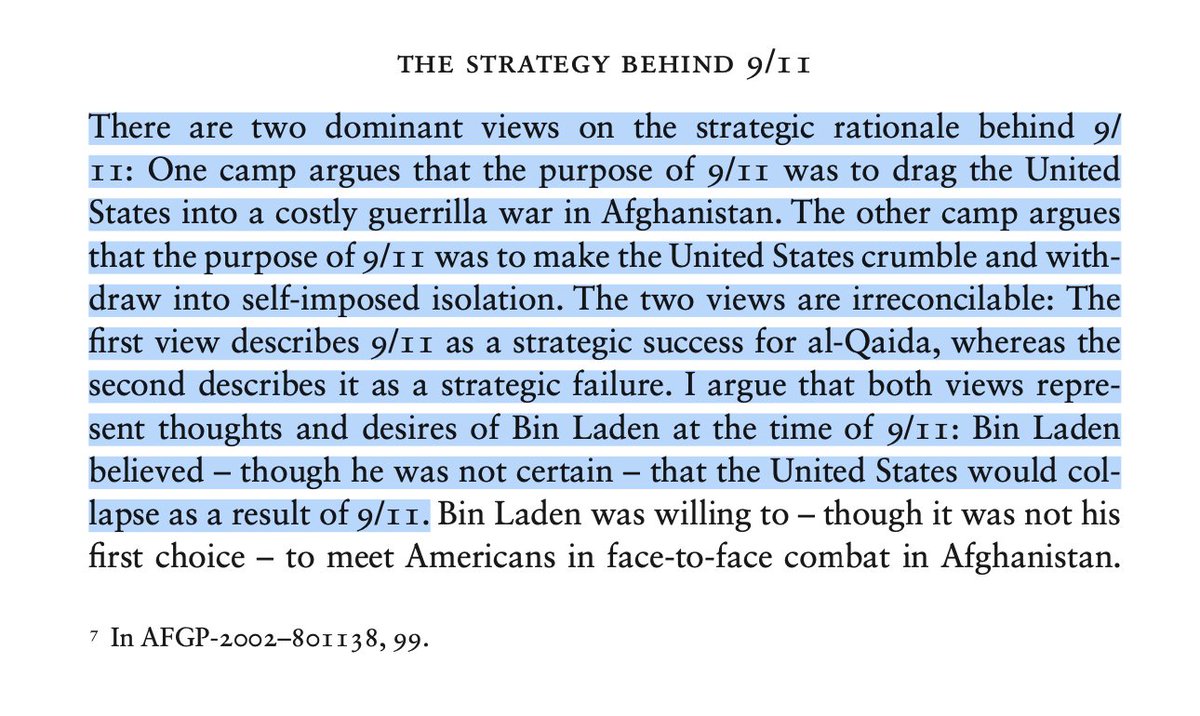
Generally speaking, I agree with Dr. Hamming -- Nelly Lahoud is an essential voice. And, I generally find agreement with Lahoud's work. I agree with these quotes -- but, something about the piece in Foreign Affairs strikes me as off... (1/x)
https://twitter.com/ToreRHamming/status/1430435748126334976
Lahoud writes that Bin Ladin committed a spectacular strategic blunder with the 9/11 attacks. Simply put -- Lahoud argues that UBL thought that the U.S. would never invade Afghanistan because U.S. citizens would protest and demand full withdrawal. 

This is where I disagree -- or at least would like to hear more. In Mustafa Hamid's recollection, noted in his interview with @allthingsct , Hamid believes that UBL hoped that the U.S. *WOULD* invade. Based on his exp fighting USSR, he thought he could create an unwinnable war. 



And @annestenersen's work suggests a similar complication to Lahoud's thesis. Stenersen argues that there are two theses, of which Lahoud's is part. 

Further -- Stenersen argues that Bin Ladin had no *way* of knowing the outcome. Instead, he tried to position his movement more effectively to address what did occur. In short, he though that no matter what the U.S. did -- invade or withdrawal -- the jihadists won. 

For AQ and Bin Ladin's strategy? Stenersen notes that UBL didn't intend *destruction* of Taliban, but knew that was a risk. What he hoped for was collapse of U.S., revolution in MENA. If invasion? Eventual collapse and retreat of US and then revolution. 

My takeaway? UBL was neither a tactical nor strategic genius. Post-9/11, his hoped for resistance was scattered -- he even apologized to his men over the radio. He was effective, though, at *messaging*. Here he is in October 2002 (trans. in Lawrence, "Message to the Americans") 

That's the key: a narrative of U.S. hypocrisy. 9/11? Invasion? Bin Ladin quickly seized on the U.S. treatment of POWs from Afg., the U.S. usage of torture & Guantanamo. He yelled a simple screed: "America lies." @attackerman hits this point well, I think.
So, for 20 years, as U.S. military and policy makers stumbled, that message was central -- "the U.S. lies and is hypocritical." Over and over. Arab Spring? War in Afghanistan? War against ISIS? What did US do for refugees? What did it do to allies (SDF? ANDSF?)
Even after UBL's death in 2011, that narrative remains. While Jihadis celebrate Taliban, and note that they see it as evidence of God's favor, they will equally watch how US & allies handle cases of refugees. And, if there is any falter, the narrative will be -- "America lies."
As a post-script, where I think Lahoud is absolutely correct is noting the 2003 invasion of Iraq as a turning point and "unforced" U.S. error. I'd also note that -- once again -- jihadist narrative framing involving a theodicy appears: God is said to have a hand in all affairs. 

And, a 2nd postscript. @Hegghammer's observation below -- that West balanced safety against rights/liberties -- suggests some validity to what's on UBL above. Also suggests that while western societies "more secure" -- is pursuit of security also reinforcing jihadist narratives? 

Sources:
Lahoud's Foreign Affairs article -- foreignaffairs.com/articles/afgha…
@Hegghammer's Foreign Affairs article -- foreignaffairs.com/articles/middl…
@allthingsct & Hamid -- Arabs at War in Afghanistan, (Hurst, 2015)
@annestenersen -- Al-Qaida in Afghanistan (Cambridge, 2017)
Lahoud's Foreign Affairs article -- foreignaffairs.com/articles/afgha…
@Hegghammer's Foreign Affairs article -- foreignaffairs.com/articles/middl…
@allthingsct & Hamid -- Arabs at War in Afghanistan, (Hurst, 2015)
@annestenersen -- Al-Qaida in Afghanistan (Cambridge, 2017)
• • •
Missing some Tweet in this thread? You can try to
force a refresh



